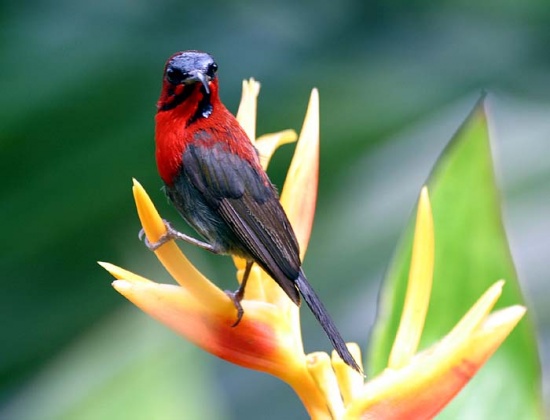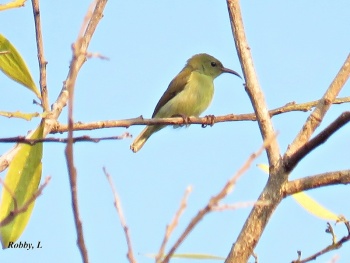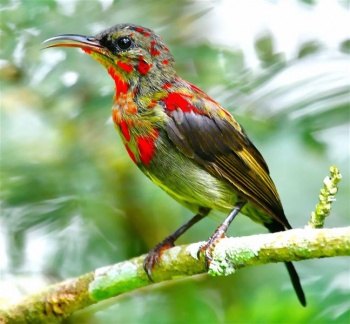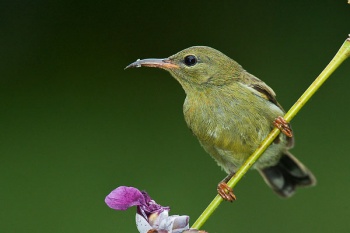(Picture of adult female) |
(→External Links: Multiple GSearches combined) |
||
| (6 intermediate revisions by 3 users not shown) | |||
| Line 1: | Line 1: | ||
'''Alternative names: Yellow-backed Sunbird; Goulpourah Sunbird; Eastern Crimson Sunbird''' | '''Alternative names: Yellow-backed Sunbird; Goulpourah Sunbird; Eastern Crimson Sunbird''' | ||
| − | [[Image:Crimson_Sunbird.jpg|thumb|550px|right|Male<br />Photo by {{user|mehdhalaouate|mehdhalaouate}}<br />[[Singapore]], July 2004]] | + | [[Image:Crimson_Sunbird.jpg|thumb|550px|right|Male<br />Photo © by {{user|mehdhalaouate|mehdhalaouate}}<br />[[Singapore]], July 2004]] |
;[[:Category:Aethopyga|Aethopyga]] siparaja | ;[[:Category:Aethopyga|Aethopyga]] siparaja | ||
==Identification== | ==Identification== | ||
| + | [[Image:Crimson sunbird female.JPG|thumb|350px|right|Female<br />Photo © by {{user|robby+thai|robby thai}}<br />Tap Lan NP, [[Thailand]], October 2014]] | ||
Crimson Sunbirds are tiny, only 11 cm long. They have medium-length thin down-curved bills and brush-tipped tubular tongues, both adaptations to their nectar feeding. | Crimson Sunbirds are tiny, only 11 cm long. They have medium-length thin down-curved bills and brush-tipped tubular tongues, both adaptations to their nectar feeding. | ||
The adult '''male''' has a crimson breast and maroon back. The rump is yellow and the belly is olive.<br /> | The adult '''male''' has a crimson breast and maroon back. The rump is yellow and the belly is olive.<br /> | ||
The female has an olive-green back, yellowish breast and white tips to the outer tail feathers. | The female has an olive-green back, yellowish breast and white tips to the outer tail feathers. | ||
| − | |||
==Distribution== | ==Distribution== | ||
| + | [[Image:Filtered ND5 9803 Medium .JPG|thumb|350px|right|Juvenile Male<br />Photo © by {{user|jweeyh|jweeyh}}<br />[[Singapore]], October 2016]] | ||
Found from [[India]] east over the [[Himalayas]], southwest [[China]], [[Indochina]], [[Malaysia]] to [[Sumatra]], [[Borneo]] and [[Sulawesi]] ([[Indonesia]]). | Found from [[India]] east over the [[Himalayas]], southwest [[China]], [[Indochina]], [[Malaysia]] to [[Sumatra]], [[Borneo]] and [[Sulawesi]] ([[Indonesia]]). | ||
==Taxonomy== | ==Taxonomy== | ||
| + | [[Image:19099C69B8365.jpg|thumb|350px|right|Juvenile female<br />Photo © by {{user|arian001|arian001}}<br />Mandai Orchard Garden, [[Singapore]]<br /> August 2005]] | ||
| + | |||
| + | This is a [[Dictionary_P-S#P|polytypic]] species<sup>[[#References|[1]]]</sup> consisting of 14 subspecies. | ||
| + | |||
[[Vigors's Sunbird]] and [[Magnificent Sunbird]] were formerly included in this species. | [[Vigors's Sunbird]] and [[Magnificent Sunbird]] were formerly included in this species. | ||
====Subspecies==== | ====Subspecies==== | ||
| − | + | [[File:Crimson_Sunbird_Flight_JAWEE.jpg|thumb|350px|right|Flight<br />Photo © by {{user|jweeyh|jweeyh}}<br />A nature park, [[Singapore]], 16 September 2021]] | |
| − | [[ | + | |
*''A. s. seheriae'': [[Nepal]] to Assam, [[Bangladesh]], [[Burma]], south-western [[China]] and north-western [[Thailand]] | *''A. s. seheriae'': [[Nepal]] to Assam, [[Bangladesh]], [[Burma]], south-western [[China]] and north-western [[Thailand]] | ||
*''A. s. labecula'': Eastern [[Himalayas]] (Bhutan to Arundal Pradesh, Assam and Bangladesh) | *''A. s. labecula'': Eastern [[Himalayas]] (Bhutan to Arundal Pradesh, Assam and Bangladesh) | ||
| Line 29: | Line 34: | ||
*''A. s. flavostriata'': Northern [[Sulawesi]] | *''A. s. flavostriata'': Northern [[Sulawesi]] | ||
*''A. s. beccarii'': Central, south-eastern and southern Sulawesi; Butung, Muna and Kabaena islands | *''A. s. beccarii'': Central, south-eastern and southern Sulawesi; Butung, Muna and Kabaena islands | ||
| − | |||
==Habitat== | ==Habitat== | ||
Found in forest, scrub and gardens below 1,800. | Found in forest, scrub and gardens below 1,800. | ||
| Line 40: | Line 44: | ||
Like all sunbirds this species has a fast and direct flight with their short wings. They can hover like hummingbirds, but usually perch to feed most of the time. | Like all sunbirds this species has a fast and direct flight with their short wings. They can hover like hummingbirds, but usually perch to feed most of the time. | ||
==References== | ==References== | ||
| − | #{{Ref- | + | #{{Ref-Clements6thAug21}} |
{{ref}} | {{ref}} | ||
==External Links== | ==External Links== | ||
| − | {{GSearch|Aethopyga | + | {{GSearch|"Aethopyga siparaja" {{!}} "Crimson Sunbird" {{!}} "Yellow-backed Sunbird" {{!}} "Goulpourah Sunbird" {{!}} "Eastern Crimson Sunbird"}} |
| + | {{GS-checked}}1 | ||
| + | <br /> | ||
| + | <br /> | ||
[[Category:Birds]] [[Category:Aethopyga]] | [[Category:Birds]] [[Category:Aethopyga]] | ||
Latest revision as of 19:15, 19 July 2023
Alternative names: Yellow-backed Sunbird; Goulpourah Sunbird; Eastern Crimson Sunbird
- Aethopyga siparaja
Identification
Crimson Sunbirds are tiny, only 11 cm long. They have medium-length thin down-curved bills and brush-tipped tubular tongues, both adaptations to their nectar feeding.
The adult male has a crimson breast and maroon back. The rump is yellow and the belly is olive.
The female has an olive-green back, yellowish breast and white tips to the outer tail feathers.
Distribution
Found from India east over the Himalayas, southwest China, Indochina, Malaysia to Sumatra, Borneo and Sulawesi (Indonesia).
Taxonomy
This is a polytypic species[1] consisting of 14 subspecies.
Vigors's Sunbird and Magnificent Sunbird were formerly included in this species.
Subspecies
- A. s. seheriae: Nepal to Assam, Bangladesh, Burma, south-western China and north-western Thailand
- A. s. labecula: Eastern Himalayas (Bhutan to Arundal Pradesh, Assam and Bangladesh)
- A. s. owstoni: Southern China (Naochow Island off Luichow Peninsula)
- A. s. tonkinensis: Southern China (south-eastern Yunnan) and north-eastern Vietnam
- A. s. mangini: South-eastern Thailand to central and southern Indochina
- A. s. insularis: Phu Quoc Island (off extreme southern Cambodia)
- A. s. cara: Southern Burma, Thailand and Mergui Archipelago
- A. s. trangensis: Peninsula Thailand, northern Malay Peninsula and adjacent Burma
- A. s. siparaja: Malay Peninsula, Sumatra, Borneo and adjacent offshore islands
- A. s. nicobarica: Nicobar Islands
- A. s. heliogona: Java
- A. s. natunae: North Natuna Islands
- A. s. flavostriata: Northern Sulawesi
- A. s. beccarii: Central, south-eastern and southern Sulawesi; Butung, Muna and Kabaena islands
Habitat
Found in forest, scrub and gardens below 1,800.
Behaviour
Diet
Feeds on nectar, insects and spiders.
Breeding
Two eggs or three eggs are laid in a suspended nest in a tree. In India it's parasitised by the Asian Emerald Cuckoo.
Flight
Like all sunbirds this species has a fast and direct flight with their short wings. They can hover like hummingbirds, but usually perch to feed most of the time.
References
- Clements, J. F., T. S. Schulenberg, M. J. Iliff, S. M. Billerman, T. A. Fredericks, J. A. Gerbracht, D. Lepage, B. L. Sullivan, and C. L. Wood. 2021. The eBird/Clements checklist of Birds of the World: v2021. Downloaded from https://www.birds.cornell.edu/clementschecklist/download/
Recommended Citation
- BirdForum Opus contributors. (2024) Crimson Sunbird. In: BirdForum, the forum for wild birds and birding. Retrieved 29 April 2024 from https://www.birdforum.net/opus/Crimson_Sunbird
External Links
GSearch checked for 2020 platform.1








